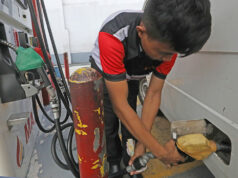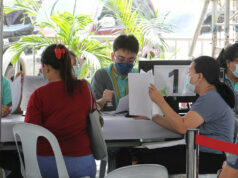Gov’t takes delivery of half-a-million Moderna vaccines

THE PHILIPPINES on Sunday took delivery of 469,200 doses of the coronavirus vaccine made by Moderna, Inc., according to the government.
The National government paid for about 319,200 doses while the private sector paid for the rest of the shipment that arrived via Singapore Airlines at the Ninoy Aquino International Airport.
More than 12,027,383 Filipinos have been fully vaccinated against the coronavirus, while 14.1 million people have taken their first dose, according to the government.
The Philippines seeks to vaccinate 58 million Filipinos in the capital region and other urban areas this year.
President Rodrigo R. Duterte placed Metro Manila under an enhanced community quarantine from Aug. 6 to 20 to contain a fresh surge in infections probably caused by the Delta variant from India.
Moderna has said its vaccine was about 93% effective four to six months after the second dose, showing hardly any change from the 94% efficacy reported in its original clinical trial.
It appeared to be more effective than the Pfizer vaccine whose efficacy rate had gone down to 84% six months after the second shot. Both the Moderna and Pfizer vaccines are based on messenger RNA (mRNA) technology.
The efficacy rate of Moderna’s vaccine was stable at 93% after four to six months, Reuters reported, citing a statement by Chief Executive Stéphane Bancel
Moderna’s second-quarter sales hit $4.4 billion, higher than the average estimate of $4.2 billion by analysts.
Its net income was $2.78 billion or $6.46 a share, beating expectations of $2.46 billion or $5.96 a share.
Medical studies have shown the coronavirus vaccine made by Pfizer, Inc. may be less effective than Moderna’s against the Delta variant.
Researchers found the effectiveness of Moderna’s vaccine against infection had dropped to 76% in July — when the Delta variant was predominant — from 86% in early 2021, Reuters said, citing researchers. During the same period, the effectiveness of the Pfizer vaccine had fallen to 42% from 76%, researchers said.
While both vaccines remained effective at preventing coronavirus disease 2019 (COVID-19) hospitalization, a Moderna booster shot may be necessary soon for anyone who got the Pfizer or Moderna vaccines earlier this year, according to Venky Soundararajan, a doctor at Massachusetts data analytics company Nference, which led the Mayo Clinic study.
In a separate study, elderly nursing home residents in Ontario produced stronger immune responses — especially to worrisome variants — after the Moderna vaccine than after the Pfizer vaccine.
The elderly may need higher vaccine doses, boosters, and other preventive measures, said Anne-Claude Gingras of the Lunenfeld-Tanenbaum Research Institute in Toronto, who led the Canadian study.
A Pfizer spokesperson said a third dose booster might be needed within six to 12 months after full vaccination to maintain the highest levels of protection against the coronavirus. — BADA



